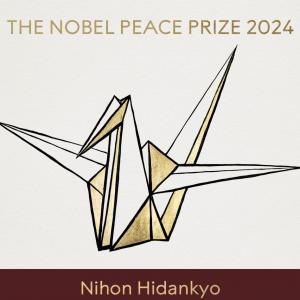"Dream, Dream, Dream! Conduct these dreams into thoughts, and then transform them into action."
- Dr. A. P. J. Abdul Kalam
"Dream, Dream, Dream! Conduct these dreams into thoughts, and then transform them into action."
- Dr. A. P. J. Abdul Kalam
21 Oct 2024
For its decades-long advocacy for peace and nuclear disarmament, Nihon Hidankyo, a Japanese atomic bomb survivors' organization, has been awarded the Nobel Peace Prize. Earlier, the Norwegian Nobel Committee praised their grassroots efforts to eliminate nuclear weapons, hailing the survivors—known as Hibakusha—for sharing their heart-wrenching testimonies of the atomic bombings of Hiroshima and Nagasaki in 1945. Through their persistent work, they have brought the horrors of nuclear warfare to the world's attention and emphasized the necessity of a world free from such catastrophic weapons.
As survivors of the most devastating form of warfare humanity has ever seen, the Hibakusha have shouldered the burden of educating the world about the harrowing effects of nuclear bombs. With their memories and scars etched into history, Nihon Hidankyo has spent over 60 years campaigning to ensure that no one else ever has to endure such unimaginable pain.
The story of Nihon Hidankyo began over a decade after the atomic bombings that reduced Hiroshima and Nagasaki to ruins, causing immense devastation and loss. Formed on August 10, 1956, the organization emerged from the second World Conference against A and H Bombs, which was convened in response to mounting concerns over nuclear testing—particularly following the United States’ hydrogen bomb test on March 1, 1954. This test sent shockwaves worldwide, highlighting the terrifying reality of nuclear weapons.
The survivors of Hiroshima and Nagasaki—those who had endured the horrors of atomic bombs—came together to form Nihon Hidankyo, determined to raise their voices. They shared their personal experiences, not out of anger, but with a deep hope that their suffering would ignite a global movement to eliminate nuclear weapons forever.

At the core of Nihon Hidankyo’s mission are the powerful and deeply moving testimonies of the Hibakusha. These survivors have spoken, time and time again, about the incomprehensible suffering caused by nuclear weapons. Their testimonies have not only educated the world about the human cost of nuclear warfare but have also humanized the abstract threat of nuclear armament.
The Norwegian Nobel Committee, in their official release, highlighted the significance of these stories. Hibakusha’s stories of surviving the bombings and their aftermath have touched hearts and minds across the globe, prompting critical discussions on disarmament and peace.
Nihon Hidankyo's efforts have extended far beyond Japan. As early as 1975, Yukimune Hajime, a co-chairperson of the organization, joined the people's delegation to the United Nations to advocate for an international treaty to ban nuclear weapons. This was not just an isolated action; it marked the beginning of a worldwide push for disarmament, leading to deeper investigations into the real-life impacts of nuclear bombings and furthering research into the suffering endured by the Hibakusha.
In 1985, the organization sent delegations to the five nuclear-armed nations, petitioning their governments to work toward the elimination of nuclear weapons. This bold and courageous move demonstrated that Nihon Hidankyo's commitment to peace was not bound by borders—it was a global call for justice and humanity.
Their voice has been steady over the years, even when faced with opposition or indifference. It is this steadfast persistence that has earned them respect and admiration. In 2005, during his Nobel Peace Prize Award Ceremony speech, Professor Ole Danbolt Mjos, the chairperson of the Norwegian Nobel Committee, made an exceptional reference to the Hibakusha and Nihon Hidankyo, saluting their ongoing efforts. In 2010, the organization was honored with the Peace Summit Award for Social Activism at the 11th World Summit of Nobel Peace Laureates.
They have built a global network united by a single goal: the total elimination of nuclear weapons.
Nihon Hidankyo’s journey, from its founding in 1956 to its Nobel Peace Prize victory in 2024, is a powerful example of how individuals, even those who have endured the worst of humanity's atrocities, can rise up and create positive, lasting change. The organization's dedication to peace has brought international attention to the devastating effects of nuclear weapons. Their unrelenting advocacy for disarmament has inspired countless others to join the cause.